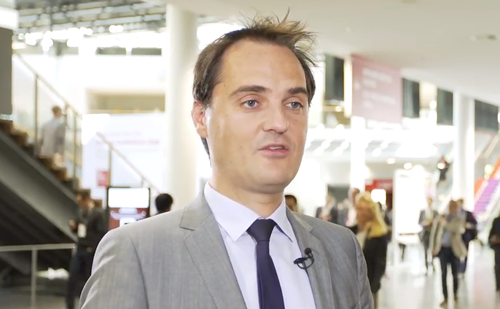Evolocumab is a proprotein convertase subtilisin kexin type 9 inhibitor (PCSK9 inhibitor). When used in combination with statins, reduced plaque volume has been observed in patients with acute coronary syndrome (ACS). In this touchCARDIO interview, we speak with Dr Annapoorna Kini (Cardiac Catheterization Laboratory, Mount Sinai Medical Centre, New York, NY, USA) to discuss the use of PCSK9 inhibitors in patients with ACS, with a focus on mechanisms of action.
Dr Kini presented an abstract entitled ‘Effect Of Evolocumab On Coronary Plaque Characteristics In Stable Coronary Artery Disease: A Multimodality Imaging Study (the Yellow III Study)’ (Abstract number 403-14) at ACC.23 Together With WCC (ACC.23/WCC) in New Orleans, 4–6 March 2023.
Click here to watch Dr Kini’s video on the Yellow III study.
Questions:
- What is known about the use of PCSK9 inhibitors in patients with acute coronary syndrome? (0:23)
- What is evolocumab and what is its mechanism of action? (1:02)
Disclosures: Annapoorna Kini has received grant/research support from Amgen for the YELLOW III study.
Support: Interview and filming supported by Touch Medical Media. Interview conducted by Danielle Crosby.
Filmed as a highlight of ACC 2023
Access more content on Imaging here and Cardiovascular Disease here
Transcript:
Good morning. I’m Dr Annapoorna Kini. I’m director of the Cath lab at Mount Sinai Medical Center in New York City. I’m also Professor of Medicine in the Icahn School of Medicine here in New York.
Q. What is known about the use of PCSK9 inhibitors in patients with acute coronary syndrome?
Most of the trials that have been done have been in patients with acute coronary syndrome because these are the patients that are unstable or who need treatment to decrease the cholesterol, especially with the statins as well as PCSK9. So the data we have has been in acute coronary syndrome as well as acute MI. And there is one other trial that has been done in stable coronary artery disease. So our trial was mostly in patients with a stable coronary artery disease.
Q. What is evolocumab and what is its mechanism of action?
So evolocumab is a PCSK9 inhibitor. Statins were introduced over 25 years ago and the way they work is by inhibiting an enzyme called HMG-CoA reductase. This enzyme is an important enzyme. It’s a rate limiting step in the mechanism of cholesterol. Cholesterol is being formed in the body no matter what, cholesterol comes from what you eat. Cholesterol and a part of cholesterol is also found in the liver, it makes cholesterol. So HMG-CoA reductase is a rate limiting step and a statin inhibits that. That is why the cholesterol that is being formed by the body is reduced by taking statins. That is why we always say lifestyle modification is key. That means people should stop eating fatty foods, especially saturated fat, and try to eat unsaturated, which is a better fat. So what you eat becomes less and what your body is producing also becomes less by taking this medication. That is how statins work.
Statins also increase another receptor. It increases this enzyme, PCSK9, it’s a monoclonal antibody, so that also increases by statins.So it is good as a synergistic mechanism that you have statin and then PCSK9 is increased. PCSK9 is a monoclonal antibody that goes and sits on a receptor called the LDL receptor. This LDL receptor is very important as this LDL receptor goes and takes out the bad cholesterol, sucks that cholesterol and gets it digested. When PCSK9 goes and sits on that LDL receptor, the receptor is not able to do that function. Therefore, by giving this medication, evolocumab, the PCSK9 is inhibited and LDL receptors are free. They can go and take this bad cholesterol and get rid of it from the body. That is why you make sure you give statins, the statin has done the job because its mechanism of action is somewhere else. PCSK9 is a synergistic drug. It works on top of it. That is then when the LDL really goes down in the patients when they take this medication.
Subtitles and transcript are autogenerated











